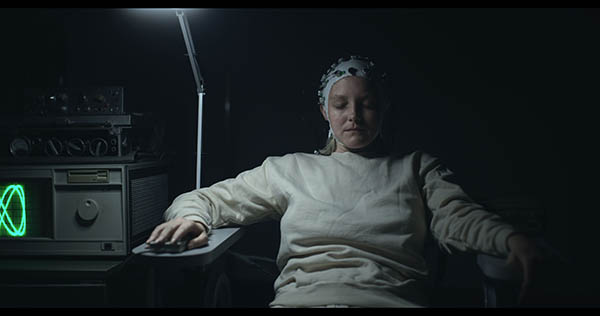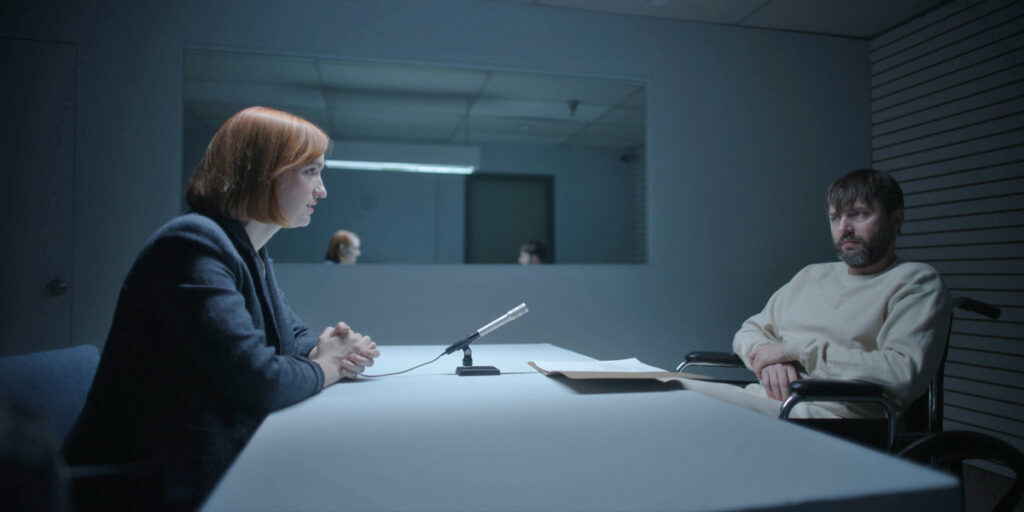Ultrasound is a unique mystery box mindbender that tells an immensely ambitious story that manages to engage and intrigue despite its low budget.
As human beings, we like to believe that we are the ones who dictate what we do in every moment and in every activity we perform. The idea that we are the creators of our own path and our destiny is one that can comfort a person even in their weakest and most uncomfortable moments. However, our freedom isn’t as free as we think. Our thoughts and our actions are often controlled by what we view in the media or by how society envisions us to act. Ultrasound is a film that explores how sinister a world can be when we entirely give into the illusions of freedom given to us by others.
Ultrasound follows a man named Glen (Vincent Kartheiser) who winds up staying the night at a strange house with a married couple after his car mysteriously breaks down. After spending the night and getting to know the couple inside, he finds himself trapped in a strange series of events that begin to tie themselves to a young medical professional and a woman who’s caught in a secret romance. As these events and people begin to merge, it only spells the beginning of a mind bending mystery.
The world that Ultrasound creates is one that doesn’t exactly feel quite like our own, yet echoes of it still remain. Many of the women in the film are seen as potential lovers or seen less as humans but more like pieces of meat that are offered to others as either a prize or a way of showing hospitality. Although the lead for the majority of the narrative is a young man, Ultrasound is ultimately a very female focused story, as three main characters have to navigate the world as a target of men who are seeking either romance or some form of control. Gaslighting is a particular theme that echoes through all of the film and adds to this thematic idea of how trapped many of the characters are whether they know it or not. As some in Ultrasound are dissected and observed in the physical and metaphorical sense, it shatters any illusions that those you see on the screen are there of their own volition.
From the outset, Ultrasound feels like it’s playing with the viewer and testing the patience of those watching. For much of its first half, it gets by with a certain sense of disconnection as we see various unrelated stories and characters with no known destination. However, the film uses this time to set out all the pieces of its own puzzle. At first, it’s confusing and a little directionless but as the pieces begin to form, a picture begins to show itself. The influences of the film such as The Twilight Zone’s twisty and topical narratives as well as the surreal works of director Yorgos Lanthimos (Dogtooth, The Lobster) are all worn on the sleeve of Ultrasound to create something unique and yet heavily inspired.

The main flaw of Ultrasound sadly falls on just how ambitious its storytelling is in regards to its very low budget. Although the film for the most part utilizes clever editing tricks and solid camerawork to mask some of its production flaws, it can’t help but feel at times like it’s unable to reach its full narrative potential due to the restraints locked on the film. For a film that presents such vast and terrifying ideas akin to paranoid conspiracy thrillers from the 70s, it can’t seem to match that energy with some cheap set design and inconsistent lighting. However, the film works best when it explores the ideas it brings forward in a playful manner rather than trying to tell and merge multiple stories into one. One subplot revolving around a young woman and a politician running for office feels half baked compared to the rest of the film which manages to find a nice blend between being deliberately confusing and confounding while also being somewhat easy to follow.
Although Ultrasound struggles somewhat with its own visual film-making language, it combats this somewhat by having a fantastic score, provided by Zak Engel, which takes notes from the works of composers like Trent Reznor and Mac Quayle by deploying some unsettling snyths and uncomfortable drones that helps mold the unknown and disconcerting nature that the film begins to take particularly in the second half as questions are answered with more questions. As well as the score, the performances from Breeda Wool and Chelsea Lopez are particular standouts that manage to finely tune themselves to the strange atmosphere that director Rob Schroeder creates. Whether they are presented as pleasant at first glance or a little bit eccentric under the surface, both actresses are able to keep up with the ambition that Schroeder is working with behind the scenes to great effect.
Ultrasound is a uniquely haunting and thrilling mystery box mindbender. Although its ambitious storytelling can’t quite be as well articulated as one would hope due to the extremely low budget, it still manages to work as a really fascinating film that explores the idea of our illusion and the power that words have on our own perceived free will. It may frustrate those unwilling to work with its ambiguity, and the film requires a heavy amount of patience that doesn’t quite reward as much as it should have, but, as an ambitious piece of independent sci-fi from a first time director in Rob Schroeder, it marks a bold beginning of a director who’s definitely on track to create some fascinating films in the future.
Ultrasound is now available to watch on digital and on demand.

